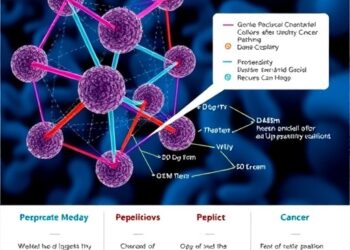HOUSTON and MILAN ― The University of Texas MD Anderson Cancer Center and Sibylla Biotech today announced a strategic collaboration agreement to discover and develop novel small-molecule cancer therapies known as folding interfering degraders (FIDs), which disrupt the proper folding of target proteins and lead to their degradation.
HOUSTON and MILAN ― The University of Texas MD Anderson Cancer Center and Sibylla Biotech today announced a strategic collaboration agreement to discover and develop novel small-molecule cancer therapies known as folding interfering degraders (FIDs), which disrupt the proper folding of target proteins and lead to their degradation.
Under the agreement, Sibylla and MD Anderson will jointly conduct discovery and development work from target identification through drug candidate nomination on selected proteins, with the potential to continue further pre-clinical and clinical development. The collaboration brings together Sibylla’s Pharmacological Protein Inactivation by Folding Intermediates Targeting (PPI-FIT) technology with the drug development expertise and capabilities of MD Anderson’s Therapeutics Discovery division.
“The Sibylla team is committed to expanding the applications of our PPI-FIT technology and FIDs to provide new treatment options for hard-to-treat indications. This collaboration builds upon the progress we have achieved to date and the applicability of our technology and know-how,” said Lidia Pieri, PhD, co-founder and chief executive officer of Sibylla Biotech. “We value the opportunity to work with MD Anderson’s team of drug development experts in order to foster our vision of treating patients with high unmet medical need.”
Sibylla’s proprietary PPI-FIT technology is used to discover and develop FIDs, small molecules that induce the degradation of target proteins by interfering with the folding pathway. Notably, PPI-FIT can be applied to target proteins currently considered “undruggable” due to the absence of suitable pockets in their native state.
“Folding interfering degraders represent an exciting new modality to target key cancer drivers, and we look forward to opportunities to advance compelling candidates forward as novel therapeutic options,” said Tim Heffernan, Ph.D., vice president and head of Therapeutics Discovery at MD Anderson. “By aligning Sibylla’s innovative PPI-FIT technology with our drug development engine, we hope to create impactful new medicines that will expand options for patients in need of more effective therapies.”
By uniting scientists, clinicians and drug development experts together within MD Anderson, the institution’s Therapeutics Discovery division is designed to eliminate the bottlenecks slowing traditional drug discovery. Seamless integration with MD Anderson physicians allows Therapeutics Discovery to develop impactful cancer therapies inspired directly by patient needs and clinical insights.
Once a drug candidate is nominated, Sibylla and MD Anderson may consider further drug development, translational, and clinical activities to advance the candidate for patients in need.
Read this press release in the MD Anderson Newsroom.
-30-
Disclosure
MD Anderson has an institutional conflict of interest with Sibylla and will implement an Institutional Conflict of Interest Management and Monitoring Plan to manage this relationship.
About Sibylla Biotech
Sibylla is disrupting the protein degradation landscape by applying a novel mechanism of action that interferes with protein folding and thereby suppresses the expression of a disease-relevant protein. Through its protein folding simulation technology platform, Pharmacological Protein Inactivation by Folding Intermediate Targeting (PPI-FIT), Sibylla identifies relevant and previously inexplorable folding intermediates for protein targets that are currently considered undruggable in their native state. The company is developing a proprietary pipeline of small molecule folding interfering degraders (FIDs) that can address a range of therapeutic areas.
About MD Anderson
The University of Texas MD Anderson Cancer Center in Houston ranks as one of the world’s most respected centers focused on cancer patient care, research, education and prevention. The institution’s sole mission is to end cancer for patients and their families around the world, and, in 1971, it became one of the nation’s first National Cancer Institute (NCI)-designated comprehensive cancer centers. MD Anderson is No. 1 for cancer in U.S. News & World Report’s “Best Hospitals” rankings and has been named one of the nation’s top two hospitals for cancer since the rankings began in 1990. MD Anderson receives a cancer center support grant from the NCI of the National Institutes of Health (P30 CA016672).




